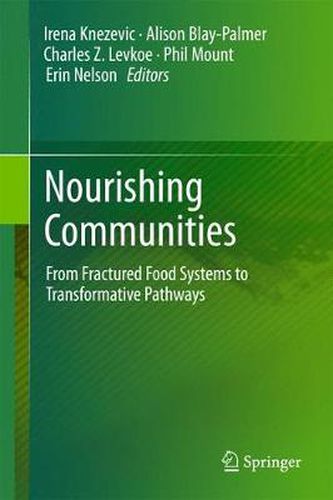Readings Newsletter
Become a Readings Member to make your shopping experience even easier.
Sign in or sign up for free!
You’re not far away from qualifying for FREE standard shipping within Australia
You’ve qualified for FREE standard shipping within Australia
The cart is loading…






This title is printed to order. This book may have been self-published. If so, we cannot guarantee the quality of the content. In the main most books will have gone through the editing process however some may not. We therefore suggest that you be aware of this before ordering this book. If in doubt check either the author or publisher’s details as we are unable to accept any returns unless they are faulty. Please contact us if you have any questions.
This edited volume builds on existing alternative food initiatives and food movements research to explore how a systems approach can bring about health and well-being through enhanced collaboration. Chapters describe the myriad ways community-driven actors work to foster food systems that are socially just, embed food in local economies, regenerate the environment and actively engage citizens. Drawing on case studies, interviews and Participatory Action Research projects, the editors share the stories behind community-driven efforts to develop sustainable food systems, and present a critical assessment of both the tensions and the achievements of these initiatives.
The volume is unique in its focus on approaches and methodologies that both support and recognize the value of community-based practices. Throughout the book the editors identify success stories, challenges and opportunities that link practitioner experience to critical debates in food studies, practice and policy. By making current practices visible to scholars, the volume speaks to people engaged in the co-creation of knowledge, and documents a crucial point in the evolution of a rapidly expanding and dynamic sustainable food systems movement. Entrenched food insecurity, climate change induced crop failures, rural-urban migration, escalating rates of malnutrition related diseases, and aging farm populations are increasingly common obstacles for communities around the world. Merging private, public and civil society spheres, the book gives voice to actors from across the sustainable food system movement including small businesses, not-for-profits, eaters, farmers and government. Insights into the potential for market restructuring, knowledge sharing, planning and bridging civic-political divides come from across Canada, the United States and Mexico, making this a key resource for policy-makers, students, citizens, and practitioners.
$9.00 standard shipping within Australia
FREE standard shipping within Australia for orders over $100.00
Express & International shipping calculated at checkout
This title is printed to order. This book may have been self-published. If so, we cannot guarantee the quality of the content. In the main most books will have gone through the editing process however some may not. We therefore suggest that you be aware of this before ordering this book. If in doubt check either the author or publisher’s details as we are unable to accept any returns unless they are faulty. Please contact us if you have any questions.
This edited volume builds on existing alternative food initiatives and food movements research to explore how a systems approach can bring about health and well-being through enhanced collaboration. Chapters describe the myriad ways community-driven actors work to foster food systems that are socially just, embed food in local economies, regenerate the environment and actively engage citizens. Drawing on case studies, interviews and Participatory Action Research projects, the editors share the stories behind community-driven efforts to develop sustainable food systems, and present a critical assessment of both the tensions and the achievements of these initiatives.
The volume is unique in its focus on approaches and methodologies that both support and recognize the value of community-based practices. Throughout the book the editors identify success stories, challenges and opportunities that link practitioner experience to critical debates in food studies, practice and policy. By making current practices visible to scholars, the volume speaks to people engaged in the co-creation of knowledge, and documents a crucial point in the evolution of a rapidly expanding and dynamic sustainable food systems movement. Entrenched food insecurity, climate change induced crop failures, rural-urban migration, escalating rates of malnutrition related diseases, and aging farm populations are increasingly common obstacles for communities around the world. Merging private, public and civil society spheres, the book gives voice to actors from across the sustainable food system movement including small businesses, not-for-profits, eaters, farmers and government. Insights into the potential for market restructuring, knowledge sharing, planning and bridging civic-political divides come from across Canada, the United States and Mexico, making this a key resource for policy-makers, students, citizens, and practitioners.